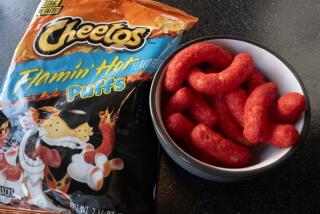Battle Over Pizza Puffery Could Reshape Ad Landscape
- Share via
A bitter legal battle being waged in a New Orleans courtroom could force some of the nation’s best-known companies to tone down some of the claims made in popular advertising jingles and slogans.
The food fight focuses on Pizza Hut’s claim that the “Better ingredients. Better pizza” slogan of the rival Papa John’s chain crosses over into false advertising.
The case has put many advertising industry executives on edge because it could prompt similar challenges against such well-known slogans as Burger King’s “It just tastes better,” Snapple’s “Made from the best stuff on Earth,” and, ironically, Pizza Hut’s own slogan “Best pizza under one roof.”
“If this case is upheld, it could diminish the ability of companies to communicate their messages through advertising,” said Dan Troy, a Washington lawyer who represents the American Advertising Federation, one of the nation’s largest advertising trade groups. “Companies will have to be more careful how they compare their products with their competitors’.”
Pizza Hut Inc., based in Dallas, scored a decisive victory in January when a federal judge prohibited Papa John’s from using its successful slogan, a potentially damaging blow to the chain that has spent $300 million since 1995 to promote the tag line. Louisville, Ky.-based Papa John’s International Inc. won a stay that cleared the slogan for use while the case moves to a hearing, scheduled for Thursday, in the U.S. 5th Circuit Court of Appeals in New Orleans.
As the two chains battle for market share in the $26-billion pizza industry, some in the advertising industry worry that appellate judges in New Orleans could redraw the comfortably blurry line separating so-called “puffery”--legally acceptable marketing bravado--and outright false advertising. The court case also could create guidelines governing when and how Madison Avenue can use such words as “good,” “better” and “best,” say Troy and other experts.
“If this case stands, it blows a gigantic hole in the advertising and marketing world as we know it,” said Jack Trout, a Connecticut-based marketing consultant who helped Papa John’s founder and Chief Executive John Schnatter write the contested slogan. “If you can’t use words like ‘better’ and ‘best,’ you’re going to cripple . . . many large marketers. It’s going to make it incredibly difficult to sell products.”
Unsubstantiated superlatives have been a staple in American advertising since the late 1800s, when newspapers and magazines were chock-full of advertisements for elixirs and other products with dubious benefits. Much of the nation’s advertising now is vetted by the Federal Trade Commission, which defines puffery as “clear hyperbole.”
Many businesses long have used puffery to tout their products. Remember “N-E-S-T-L-E-S, Nestle’s makes the very best chocolate”? But advertising industry executives say that the Pizza Hut-Papa John’s case could force changes to such slogans as BMW’s “The ultimate driving machine.”
Advertisers are reticent to talk on the record about whether their slogans might be endangered. “Our ads aren’t confrontational,” said one corporate spokesman. “We stick with a general claim backed by consumer research that suggests people like our products. We’re not putting down a competitor.”
Joel Winston, assistant director of advertising practices for the FTC, which has not issued an opinion on the legitimacy of the Papa John’s slogan, says the agency considers as puffery any “type of claim that people would not expect to be documented and would not take seriously.”
Some advertising industry experts argue that the FTC and the advertising industry’s own arbitration panel regularly turn a deaf ear to puffery that crosses the line. “They’re constantly letting it go too quickly because they assume consumers take these claims to be meaningless,” said Ivan Preston, a University of Wisconsin at Madison professor who wrote a book about puffery and has advised regulators on the subject.
As an example Preston cited a case in which E-Loan Inc. asked the National Advertising Division, a voluntary organization supervised by the Council of Better Business Bureaus, to declare IOwn.com’s advertising false because it claimed “the best loans online.” NAD said it was acceptable puffery; Preston disagrees.
If puffery is meaningless, Preston said, “you have to wonder why advertisers spend so much on it.”
Such forceful legal challenges as Pizza Hut’s assault on the Papa John’s chain are rare in a world awash in advertising, where successful slogans can stand out like Jennifer Lopez at the Grammys.
Arguments in New Orleans this week will turn on such culinary questions as whether Papa John’s canned pizza sauce tastes better than Pizza Hut’s reconstituted tomato paste, and if Papa John’s slow-rising dough is of higher quality than Pizza Hut’s frozen dough.
The New Orleans hearing marks the third time the pizzerias have faced off. Pizza Hut in 1998 challenged Papa John’s in the NAD, which typically is the court of last resort in advertising disputes.
Unwilling to live with the NAD decision in favor of Papa John’s, Pizza Hut filed a federal suit in Dallas accusing Papa John’s of fraudulent and misleading advertising. Papa John’s countersued, accusing Pizza Hut of false advertising in attacking Papa John’s.
In January, a jury determined that the Papa John’s slogan was false and misleading because the chain had failed to prove its sauce and dough were superior. But jurors also found that Pizza Hut had misled consumers in ads that implied Papa John’s was using stale dough.
U.S. Magistrate Judge William Sanderson at the time ordered Papa John’s to stop using its “Better ingredients. Better pizza” slogan and to pay Pizza Hut almost $468,000 in damages.
The judge found Papa John’s advertising to be disparaging of Pizza Hut. He cited a commercial in which Papa John’s boasted of using filtered water to prepare its dough--while the “biggest chain” used “whatever comes out the tap.”
Papa John’s commercials played upon a “commonly held though unsupported bias in favor of fresh ingredients,” the judge said.
Sanderson said the “Better ingredients. Better pizza” slogan was acceptable puffery until 1997, when Papa John’s ads began to tout the chain’s tomato sauce and pizza dough as superior. “The slogan itself became tainted to the extent that its continued use should be” stopped, the judge held.
Winston, the FTC official, said he understood the judge’s reasoning.
“It’s one thing to say your products are better [and] and that may be considered puffery,” Winston said. “ When you start getting specific about how you’re better and why you’re better, at that point consumers may start to expect that there is actual documentation for that claim.”
Pizza Hut’s lawsuit led to what legal experts describe as a monumental victory in Dallas.
“The judge and jury decided that they crossed the line,” said Mike Rawlings, Pizza Hut’s president. “This was a complicated and clever strategy to trick the public. . . . We wanted to establish a firm line between what’s legal and what’s not. And I think it’s very healthy for companies to be held to the standard of having to make sure what they’re claiming is true.”
The case is being closely followed by the advertising world. David Versfelt, a New York attorney who specializes in advertising law, said some advertisers will be careful in making claims that their products are superior. “Words that traditionally implied puffery cannot be assumed to [do so] anymore,” he said.
Hal Shoup, who heads the Washington office of the American Assn. of Advertising Agencies, said he believes that more companies will now be emboldened to file challenges against their rivals.
The war appears to be far from over. Papa John’s stands ready to challenge Pizza Hut’s plan to trademark its “Best pizzas under one roof” slogan with the U.S. Patent and Trademark Office. “If they’re saying ‘The best pizza under one roof,’ then we should be able to say ‘Better ingredients. Better pizza,’ ” said Schnatter, Papa John’s CEO.
Will the war continue on a new front if Papa John’s wins the battle of New Orleans?
“Let’s see what the appellate court has to say first,” Schnatter said. “Hopefully, we won’t have to open another can of worms.”
More to Read
Inside the business of entertainment
The Wide Shot brings you news, analysis and insights on everything from streaming wars to production — and what it all means for the future.
You may occasionally receive promotional content from the Los Angeles Times.










